Undergraduate Course
Physiotherapy BSc (Hons)
Gain the knowledge and clinical skills you need to become a registered Physiotherapist, in a supportive and stimulating environment.
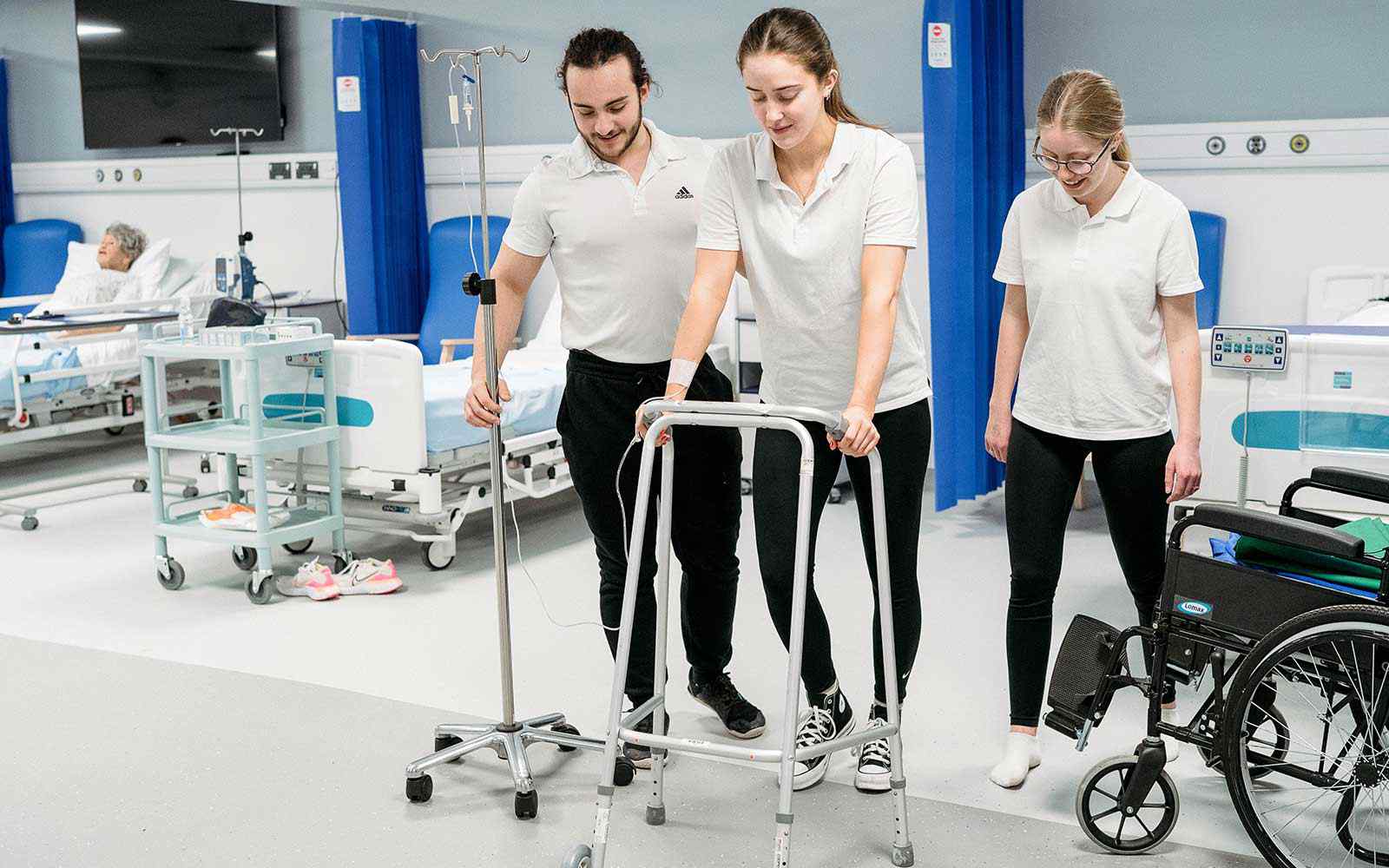
Learn to diagnose and rehabilitate patients of all ages with acute or chronic conditions. Our course is accredited by the Chartered Society of Physiotherapy (CSP) and validated by the Health and Care Professions Council (HCPC). This means that when you graduate you can apply for registration to practice as a Chartered Physiotherapist. We will help you to become a successful physiotherapist who is fit for purpose and practice.
100% of our Physiotherapy graduates were in further study or high-skilled employment 15 months after graduating. (Complete University Guide 2022)
94% Physiotherapy students responded with a 94% positivity score for how good teaching staff are at explaining things. (National Student Survey 2023)
York campus
- UCAS code – B160
- Duration – 3 years full time, 6 years part time
- Start date – September 2024, September 2025
- School – School of Science, Technology and Health
Minimum entry requirements
ABB from A2 subjects to include Grade B or above in Biology or PE (but excluding General Studies) or equivalent.
5 GCSEs at grade C/4 (or equivalent) including English language, maths and science.
Tuition fees
UK 2024 entry £9,250 per year full time
International 2024 entry £14,000 per year full time
Discover Physiotherapy
Physiotherapy at York St John
Matt Hoare, Lecturer in Physiotherapy, introduces us to Physiotherapy at York St John University.
Student story
Physiotherapy (Pre-Registration) MSc student Lawrence discusses his time at York St John.
Course overview
Master the skills, knowledge and professional behaviours you need to work as a physiotherapist. When you study on this course you will use a problem-based approach as you learn, working with your classmates to solve various physiotherapy problems.
We will guide you to become a competent and reflective practitioner who takes responsibility for your own continued professional development. You will learn to deliver ethical and effective physiotherapy services in different healthcare settings. Some of the things you will study include:
- Human anatomy and physiology
- Professionalism in healthcare
- Musculoskeletal conditions
- Cardiovascular respiratory conditions
- Paediatrics
- Exercise therapy
- Movement analysis
- Mental health
- Chronic pain
- End of life care
- The military human
- Research methods
A key element of the course is applying your learning on professional placements each year. Experienced Physiotherapists will supervise you as you complete 1,000 hours of placement in different clinical, health and social care settings. This will give you experience working across the profession, and with various different conditions and patients. During Year 2 there may be the opportunity to complete your placement abroad. This is a great chance to experience a different healthcare system, meet new friends and make lifelong memories.
Because this degree is accredited by the CSP and validated by the HCPC, you will meet the requirements for registration with both organisations when you complete the course. This will allow you to practise under the title of Chartered Physiotherapist.
Course structure
Year 1
Our academic year is split into 2 semesters. How many modules you study each semester will depend on whether you are a full time or part time student.
In your first year, if you are a full time student, you will study:
- 3 compulsory modules across semesters 1 and 2
- 1 compulsory Professional Practice placement module across semester 2 and the summer break
If you are studying part time, the modules above will be split over 2 years. You will study:
- 1 compulsory module across semester 1 and 2 in your first year
- 2 compulsory modules across semester 1 and 2 in your second year
- 1 compulsory placement module at the end of semester 2
You can find out which modules are available in each semester on the Course Specifications.
Modules
Credits: 60
Compulsory module
On this module you will develop your understanding of human anatomy and physiology, exploring how this relates to the musculoskeletal system, central and peripheral nervous system, and cardiovascular and respiratory systems. You will take a holistic and practical approach, using examples of case studies from clinical practice to develop your understanding of physiotherapy. This will ensure the skills and knowledge you gain are transferable to various clinical settings.
Credits: 20
Compulsory module
On this module you will develop your awareness of professional issues within physiotherapy, and in healthcare more generally. You will build on your developing clinical knowledge from earlier modules to further consider professional standards in the industry. This module will help you to confidently engage in your first practice-based placement as a professional student physiotherapist. In this role you will also be acting as an ambassador for York St John University and the physiotherapy profession.
Credits: 20
Compulsory module
Exercise therapy is a key component of physiotherapy practice with a broad range of health service users. On this module you will develop the skills needed to apply exercise therapy to individual and group situations. You will also learn to foster effective management and inter-professional working with users who have acute and long term conditions. Exercise therapy also involves discussing, planning and managing messages targeting health promotion.
Credits: 20
Compulsory module
On this module you will put into practice the knowledge, skills and attitudes gained so far on the course. During your placement you will be required to carry out your duties and responsibilities in a professional, ethical and moral manner. Your placement will provide you with the opportunity to apply your understanding of anatomy, physiology and pathology of the musculoskeletal system, neurological, cardio-vascular and respiratory systems. On your placement you will develop and put into practice the clinical reasoning skills required in the management of physiotherapy patients in different settings of health care delivery.
Year 2
In your second year, if you are a full time student, you will study:
- 2 compulsory modules in semester 1
- 3 compulsory Professional Practice placement modules in semester 2
If you are studying part time, the modules above will be split over 2 years. You can choose to either:
- Split your placement modules across both years
- Complete 3 placements modules in the last year of this level of study
You can find out which modules are available in each semester on the Course Specifications.
Modules
Credits: 40
Compulsory module
This module will see you develop your knowledge in cardiovascular respiratory and neurological conditions. You will also advance your practical skills in musculoskeletal practice. Through this you will build your awareness of physiotherapy roles, collaborative working, and contemporary management approaches, such as pharmacology.
Credits: 20
Compulsory module
On this module you will write a research proposal which will help prepare you for your dissertation in your final year. To do this you will use the knowledge and skills in research, designs of research, data collection methods, ethics and evaluation clinical studies you have built so far in your degree.
Credits: 20 each
Compulsory module
Putting into practice the knowledge, skills and attitudes you gained in your first year, these placement modules will introduce you to an increasingly broad range of patient problems. You will be based in variety of primary or secondary care environments, allowing you to experience different settings of health care delivery.
Year 3
In your third year, if you are a full time student, you will study:
- 3 compulsory modules including a Dissertation and Professional Practice placement module across semesters 1 and 2
- 1 compulsory module in semester 1
If you are studying part time, the modules above will be split over 2 years. You will study:
- 1 compulsory Dissertation module across semester 1 and 2 of your first year
- 1 compulsory module in semester 1 of your first year
- 1 compulsory placement module in semester 2 of your first year
- 1 compulsory module across semester 1 and 2 of your second year
- 1 compulsory placement module in semester 1 of your second year
You can find out which modules are available in each semester on the Course Specifications.
Modules
Credits: 20
Compulsory module
Having conducted a research proposal in your second year, you will now be able to approach this dissertation module with a thorough understanding of research issues. This will enable you to undertake your own research project, and to contribute to the collective evidence base. The development of research skills throughout the course will enable you to confidently move into the workplace as an effective evidence-based practitioner, capable of undertaking meaningful and clinically relevant research.
Credits: 20
Compulsory module
On this module we will help to prepare you for employment in the contemporary health and social care environment, where clinical services and practice are constantly developing and changing. You will explore:
- Health and social care policy and organisation
- Legal and ethical issues
- Leadership and service development
You will also receive careers guidance, building skills such as reflection, professional development planning, and producing a professional portfolio.
Credits: 40
Compulsory module
This module will help you to develop your knowledge in more complex areas of practice. You will address the changing nature of health and social care, for example by considering patients with multiple co-morbidities. Your lectures will be supported by associated workshops, which allow you to further explore physiotherapeutic skills. You will be encouraged to reflect on different models of care, as well as issues relating to service provision.
Credits: 40
Compulsory module
This modules places an emphasis on the holistic treatment of patients with complex problems across a variety of conditions. Your learning will be based in a range of primary and secondary care environments, allowing you to experience differing settings of health care delivery. You will need to demonstrate that you can integrate academic study and practice based learning.
Teaching and assessment
Teaching and learning
Your modules will increase in complexity as you progress through your degree. We deliver your modules through:
- Lectures
- Seminars
- Interactive workshops
- Practical anatomy and skill sessions
- Professional practice placements
If you are studying full time you will have 15 to 20 hours of contact time per week. If you are studying part time you will have 8 to 10 hours of contact time per week. In your final year there will be less contact time as you work on your Dissertation and placements. We schedule our taught sessions between 9.00am and 8.00pm, Monday to Friday.
You will need to conduct independent study outside of your contact hours. This might include reading, research and coursework preparation. You can also arrange academic tutorials to receive feedback on your work and discuss the course content.
Our teaching draws on both our research and professional experience. This means your learning is informed by the most current thinking in the subject area. You can find out more about our research and backgrounds by visiting our staff pages.
Assessment
Assessment types vary from module to module. Some of your assessments might include:
- Practical case study presentations
- Written evidence based reports
- Essays
- Poster presentations
- Oral exams, known as viva voces
For each assessment you will have the chance to talk to a tutor about your work before submission, submission as we support you through formative assessment. Each assessment will be marked and returned with feedback so you can improve your academic writing.
Placements
You will complete 1,000 hours of professional placement as part of this course. Placements will be across Yorkshire and the Humber and last 5 weeks.
You will experience placements in different health and social care settings. You may also be able to complete an international placement in your second year.
Career outcomes
Your future with a degree in Physiotherapy
This course will prepare you for a career as a physiotherapist in various professional settings. You will also develop diverse skills that can be used in a range of jobs. These include research, analysis, problem solving and communication skills.
Discover more career options on Prospects careers advice pages.
You could also progress onto a postgraduate degree and take your learning even further.
Postgraduate courses at York St John University
PGCE at York St John University
Further your education and work towards a rewarding career in teaching by studying for a Postgraduate Certificate in Education (PGCE) after you graduate. For over 180 years, we have worked with enthusiastic individuals who want to shape the future of young people across both primary and secondary school settings. You'll spend a lot of time in schools, developing your practice by teaching. You will graduate with Qualified Teacher Status and become part of the well respected alumni of York St John educators.
Whatever your ambitions, we can help you get there.
Our careers service, LaunchPad provides career support tailored to your ambitions. Through this service you can access:
- Employer events
- LinkedIn, CV and cover letter sessions
- Workshops on application writing and interview skills
- Work experience and volunteering opportunities
- Personalised career advice
This support doesn't end when you graduate. You can access our expert career advice for the rest of your life. We will help you gain experience and confidence to succeed.
Entry requirements
Qualifications
Minimum entry requirements
ABB from A2 subjects to include Grade B or above in Biology or PE (but excluding General Studies) or equivalent.
5 GCSEs at grade C/4 (or equivalent) including English language, maths and science.
Calculate your UCAS Tariff points
| Qualification | Minimum grade | Minimum science requirements |
|---|---|---|
| A level (A2) | ABB (excluding General Studies) | B in biology or physical education |
| BTEC Extended Diploma | Distinction, Distinction, Merit |
Your BTEC must be in a related subject area such as science, sport or health and social care. You must have achieved a minimum of DDM, and this must include a minimum of 3 modules containing human biology, anatomy and/or physiology. |
| International Baccalaureate | 34 points | Grade 6 or higher in Higher Level Biology. |
| Access to Higher Education Diploma | 45 credits at level 3 | The course must be in a related subject area such as Allied Health Professions or science. You must have passed 3 modules of human biology, anatomy or physiology. |
| Previous study in Higher Education (HE) | Foundation Year, HNCs, HNDs | Your HE study must be in a related area. You will need to achieve high grades in a biology subject. These applications are considered on a case by case basis. |
| A combination of qualifications | 128 UCAS points or higher | Any Biology courses listed in this column. We may consider level 3 BTECS with up to 2 grades if they equivalent to an A level in biology. |
| T Level | Merit or higher | Students who have studied a course in Health and Science will be considered. Students must have achieved a minimum grade of a Merit. |
We do not accept Adult Numeracy or Key Skills in place of of GCSE Maths. We do not accept Adult Literacy or Key Skills instead of GCSE English Language.
Interview
If we think your application is outstanding, we will invite you for an interview. We do not interview every applicant. Find out more about the Physiotherapy interviews, what you will need and what you can expect on the day.
Additional requirements
For entry onto this course, you will also need:
- A Disclosure and Barring Service (DBS) check
- A satisfactory medical report
- Insight into the Physiotherapy profession
Your experience can be in any setting a physiotherapist works in or an environment that gives you insight into healthcare practice. We do not require a specific amount of work experience. If you struggle to find work shadowing experience, detailed insight into physiotherapy through online research is acceptable.
International students
If you are an international student you will need to show that your qualifications match our entry requirements.
Information about international qualifications and entry requirements can be found on our International pages.
If English is not your first language you will need to show that you have English Language competence at IELTS level 7.0 (with no skill below 6.5) or equivalent.
International entry requirements
Terms and conditions
Our terms and conditions, policies and procedures contain important information about studying at York St John University. You can read them on our Admissions page.
Fees and funding
UK 2024 entry
The tuition fee for 2024 entry onto this course is
- £9,250 per year for full time study
- £6,935 per year for the first 4 years if you study part time
These prices apply to all UK, Jersey, Guernsey and Isle of Man students.
You can find out more about funding your degree by visiting our funding opportunities page.
NHS Training Grant
If your application to this course is successful, you can apply for extra financial support from the NHS. This is a non-means-tested grant. Find out how to apply.
Tuition fees
UK 2024 entry £9,250 per year full time
International 2024 entry £14,000 per year full time
International 2024 entry
The tuition fee for 2024 entry to this course is £14,,000 per year for full time study.
This price applies to all students living outside the UK.
Due to immigration laws, if you are an international student on a Student Visa, you must study full time. For more information about visa requirements and short-term study visas, please visit the International Visa and Immigration pages.
Find out more about funding your degree.
Additional costs and financial support
There may also be some additional costs to take into account throughout your studies, including the cost of accommodation.
Course-related costs
While studying for your degree, there may be additional costs related to your course. This may include purchasing personal equipment and stationery, books and optional field trips.
Study Abroad
For more information on tuition fee reductions and additional costs for studying abroad, please visit our study abroad pages.
Accommodation and living costs
For detailed information on accommodation and living costs, visit our Accommodation pages.
Financial help and support
Our Funding Advice team are here to help you with your finances throughout your degree. They offer a personal service that can help you with funding your studies and budgeting for living expenses.
For advice on everything from applying for scholarships to finding additional financial support email fundingadvice@yorksj.ac.uk.
Course highlights
Brilliant facilities
You will have access to spacious clinical labs with fully adjustable treatment plinths.
Clinical simulation
Benefit from access to the clinical simulation labs at York Hospital to support your learning in a multi disciplinary team (MDT) simulated environment.
The latest equipment
You will be able to use the latest equipment in our physiotherapy labs. These include an ultrasound scanner and more.
Alexandra Physiotherapy
I find my course challenging but very enjoyable. We cover the main 3 physiotherapy areas; Musculoskeletal, Neuro and Respiratory which we build on during placements. We have a mixture of practical exams, essays and presentations which I think is good as these require different skills to develop and it means if you are less strong in one aspect you can make it up in another. I particularly like placements, we do 6 all together so work in a variety of different areas.
Mark Physiotherapy alumnus
I will remember my time at York St John for the knowledgeable lecturers who worked together to deliver a very organised course. I now work as a physiotherapist on an acute medical ward and my course was excellent preparation for this.
Melissa Physiotherapy
We did 1,000 hours of clinical placement in different areas and specialities. This was a great way to put into practice everything that we learned, while working alongside health professionals in a clinical environment.

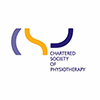
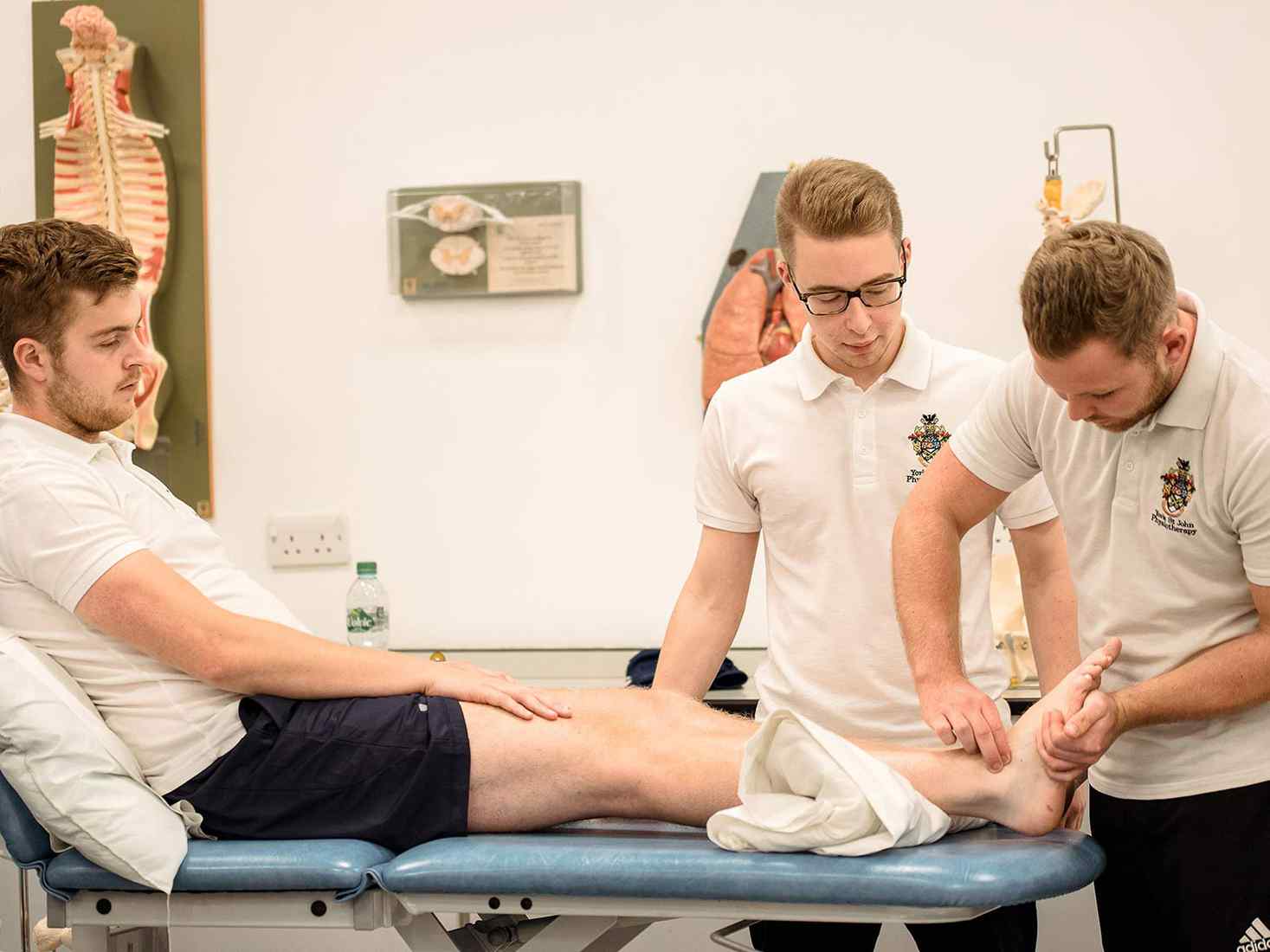
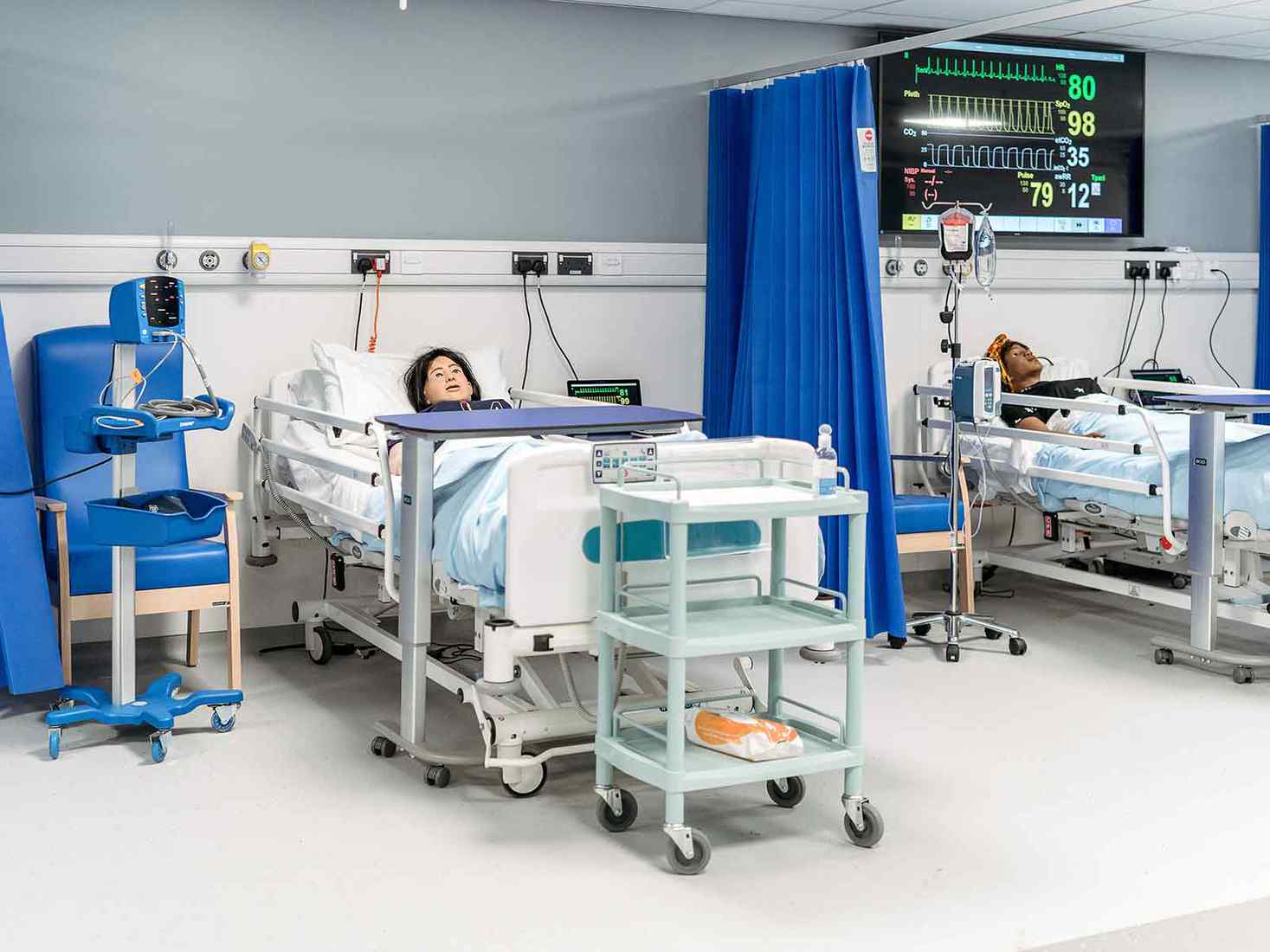
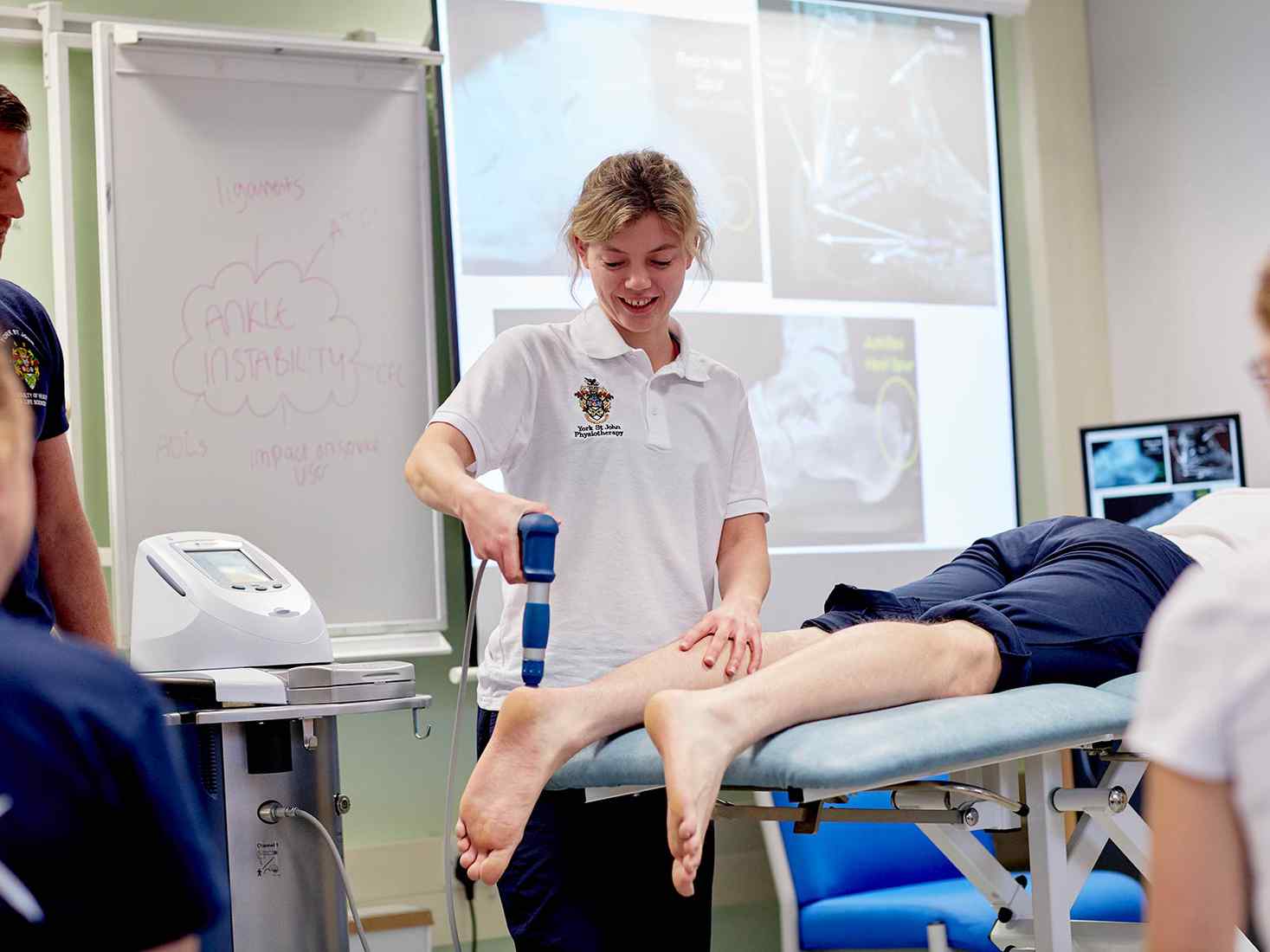
.jpg)


